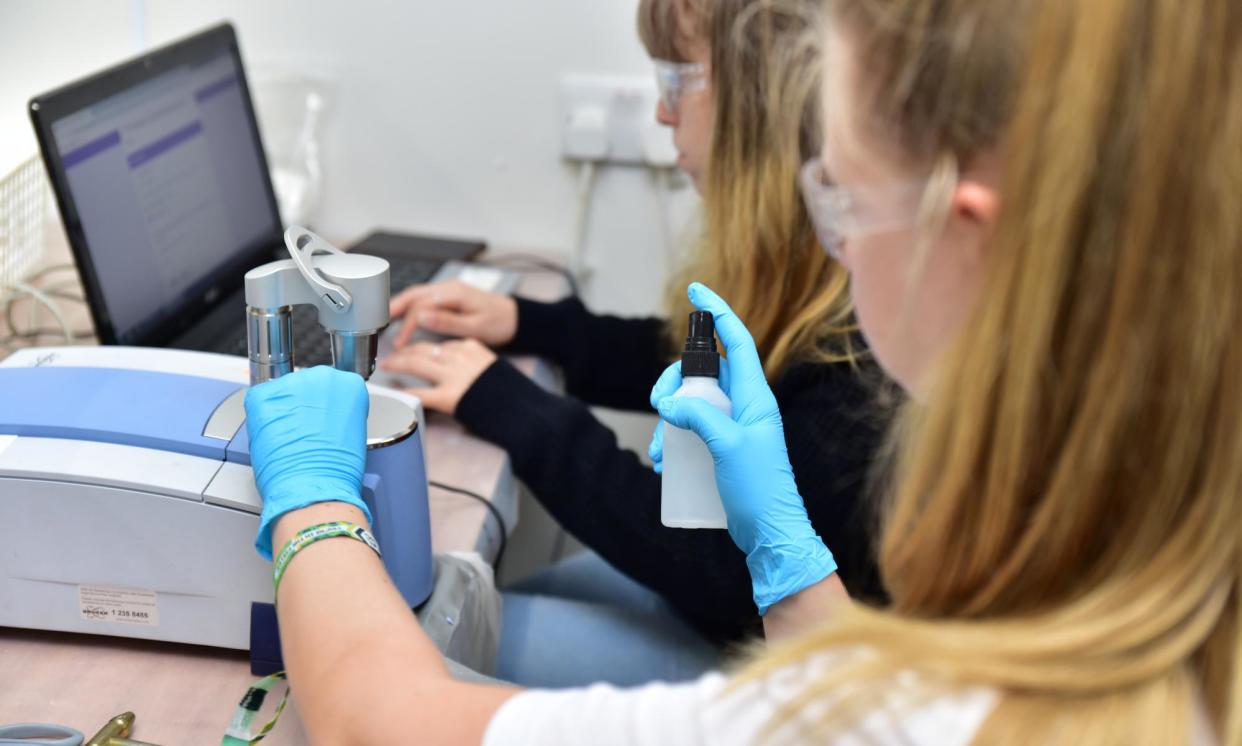‘Landmark moment’: UK’s first regular drug testing service to open in Bristol

The UK’s first regular drug testing service is to open on Saturday in Bristol with a Home Office licence, marking a significant progressive shift in government policy.
The testing will allow people who are frequent or dependent users of drugs including heroin, crack, benzos and spice to check they are not contaminated with harmful cutting agents, or adulterated with high-strength synthetic opioids such as nitazines or fentanyl.
The free and confidential service will be open once a month initially and delivered by the drug-testing charity The Loop in partnership with the drug and alcohol services charity the Bristol Drugs Project (BDP) and Bristol city council, which is providing the funding.
People who use drugs will be able to surrender small amounts into an amnesty bin at the BDP’s headquarters in central Bristol. The contents and strength of the drug will be chemically tested in a mobile lab. The service users return about an hour later to receive individually tailored harm reduction consultations with health professionals.
No drugs are handed back, and local harm reduction alerts would be issued if dangerous drugs are detected. The aim is to reduce consumption of dangerous and high-strength drugs and thus lessen the risk of poisoning and overdose, while signposting service users to local treatment and health services.
“This is a landmark moment for harm reduction,” said Prof Fiona Measham, the founder of The Loop and chair in criminology at the University of Liverpool. It followed 12 years of preparations, evaluations and negotiations with stakeholders, including the Home Office, during which time The Loop provided testing at a number of music festivals with local authority and police permission and demonstrated the public health benefits.
“With more cities due to follow soon, this launch represents the start of a new era for drug-checking and it could not come at a more important time,” Measham added. “The risks from adulteration of the illegal drug market have never been greater.”
There were almost 5,000 drug-related deaths in 2022, the highest level since records began, and there have been warnings that heroin is increasingly being cut with synthetic opioids, such as nitazenes, with dozens of deaths in relation to these potent drugs confirmed last year. There are fears those deaths may only be the tip of the iceberg – and drug testing would identify the presence of such substances.
The Bristol city council lead for public health, Ellie King, said a public health approach to drug policy put people’s wellbeing first and was intended to help save lives. The service could be increased and made available more often if there is demand.
“As the first city in the UK to have a regular drug-checking service in the heart of the city, we will be able to provide communities with access to factual, scientific, evidence-based information about drugs they may consume and that are in circulation throughout the wider city,” she said.
The rollout of the service was delayed almost two years. The Loop was granted a Home Office licence for regular drug checking in March 2022 and the facility in central Bristol was ready to launch but it was delayed at the last minute by the council. The licence does not allow for non-dependent drug users to receive consultations about the contents of so-called party drugs such as MDMA.
Evidence indicates that The Loop’s consultations with service users lead them to take drugs more responsibly. Studies at festivals where the charity has offered its facility have suggested a reduction in drug-related incidents onsite and in hospital admissions.
“The government can help save lives by reducing risks of poisoning and overdose from adulterated or missold illegal drugs,” said Steve Rolles, the senior drug policy analyst at Transform Drug Policy Foundation. “The need for drug checking is becoming increasingly urgent in the UK with the growing threat from potent synthetic opioids like fentanyl and nitazines.”
Drug-checking services have operated across cities in Europe for four decades, with apparent public health benefits. The opening of the service in Bristol will pave the way for cities in Scotland to move ahead with plans to establish similar facilities. The Loop is also in discussion with a handful of councils in other English cities.
A Home Office spokesperson said: “We are clear – there is no safe way to take illegal drugs. This licence, issued under strict conditions, will mean the most vulnerable people at risk of dying from their addiction can receive guidance and support to help them become drug free, whilst providing vital intelligence to local agencies and police to help respond to dangerous drugs in circulation.”


